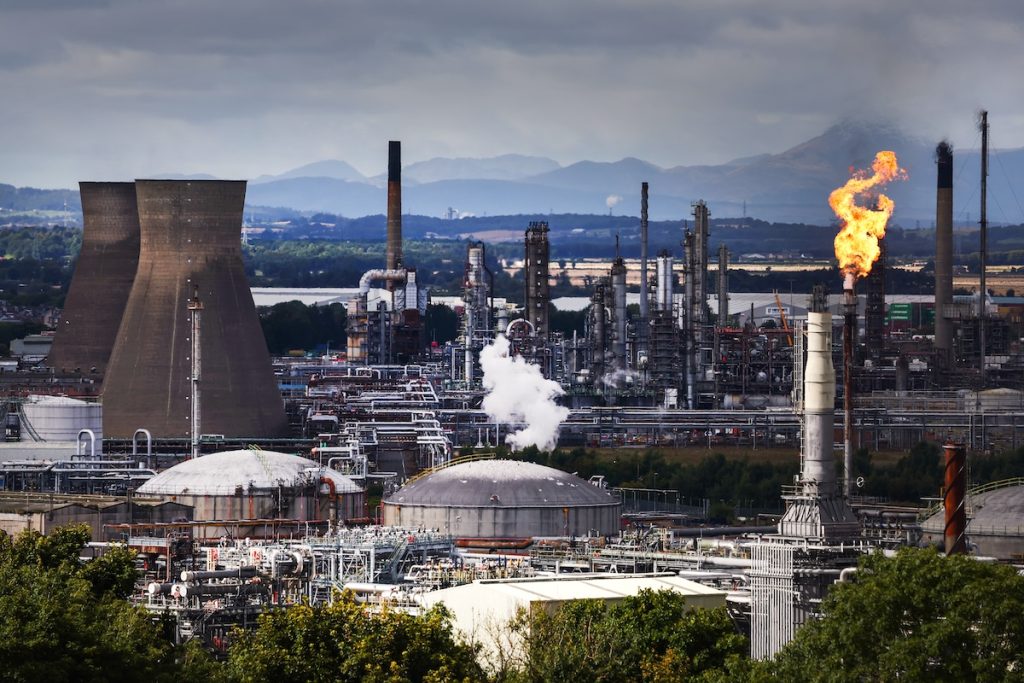Scotland’s Only Oil Refinery to Shut Down Next Year
3 min read
Scotland’s Grangemouth oil refinery on Sept. 12, 2024. Jeff J Mitchell / Getty Images
Founded in 2005 as an Ohio-based environmental newspaper, EcoWatch is a digital platform dedicated to publishing quality, science-based content on environmental issues, causes, and solutions.
Grangemouth, Scotland’s lone oil refinery, is scheduled to shut down by the summer of 2025. The owner of the site said it can’t compete with others in Africa, Asia and the Middle East.
The closure of the oldest refinery in Britain will be a big blow to the site’s 500 employees, as well as Scotland’s industrial base, reported The Guardian.
Operator Petroineos — a joint venture of PetroChina and British company Ineos — said the refinery will shut down during the second quarter of next year and become a fuel distribution hub and import terminal.
“The action we are taking to create an import terminal will safeguard fuel supply for Scotland. We currently expect Grangemouth to be ready to operate as a national distribution hub for finished fuels in Q2 next year,” said Petroineos Refining’s chief executive Franck Demay, as BBC News reported.
The governments of the United Kingdom and Scotland have promised to put joint funding of roughly $26 million toward supporting workers and the community by investing in new local energy projects. This is in addition to $105 million from a growth deal for Grangemouth and neighboring Falkirk.
“We are announcing a package of investment to help the workforce find good, alternative jobs, invest in the community and serve a viable industrial future for the Grangemouth site, with potential for future support from the national wealth fund… Unlike in the past, the government is working in lockstep with the Scottish government across every front,” said UK Energy Secretary Ed Miliband, as reported by The Guardian.
The deal is expected to provide an estimated more than $824 million to benefit the Falkirk area economy over the next three decades, as well as create 1,660 jobs.
Petroineos said $1.2 billion had been invested in Grangemouth since 2011, with losses of more than $775 million during the same period, Reuters reported. The company said the plant is suffering losses of approximately $500,000 daily, with a $200 million loss expected for 2024.
“Grangemouth is increasingly unable to compete with bigger, more modern and efficient sites in the Middle East, Asia and Africa. Due to its size and configuration, Grangemouth incurs high levels of capital expenditure each year just to maintain its licence to operate,” the company said.
Demay said demand for the fossil fuels produced at Grangemouth was falling. He added that the ban on new gas-powered and diesel cars coming into force in the next decade meant the market for fuels produced at the site would continue to shrink.
“The Scottish government and the UK government have both jointly funded a study which has identified a short list of credible options to begin the building of a new long-term industry at the refinery site, including low carbon, hydrogen, clean fuels and sustainable aviation fuels,” said John Swinney, Scottish first minister, as reported by The Guardian.
Local politicians and trade unions opposed the decision to shut down Grangemouth.
“This is an act of industrial vandalism, pure and simple. This dedicated workforce has been let down by Petroineos and by the politicians in Westminster and Holyrood who have failed to guarantee production until alternative jobs are in place,” said Sharon Graham, general secretary of Unite union, as The Guardian reported. “This is now the last chance for this Labour government to show whether it’s really on the side of workers and communities. The road to net zero cannot be paid for with workers’ jobs.”
Subscribe to get exclusive updates in our daily newsletter!
By signing up, you agree to the Terms of Use and Privacy Policy & to receive electronic communications from EcoWatch Media Group, which may include marketing promotions, advertisements and sponsored content.





